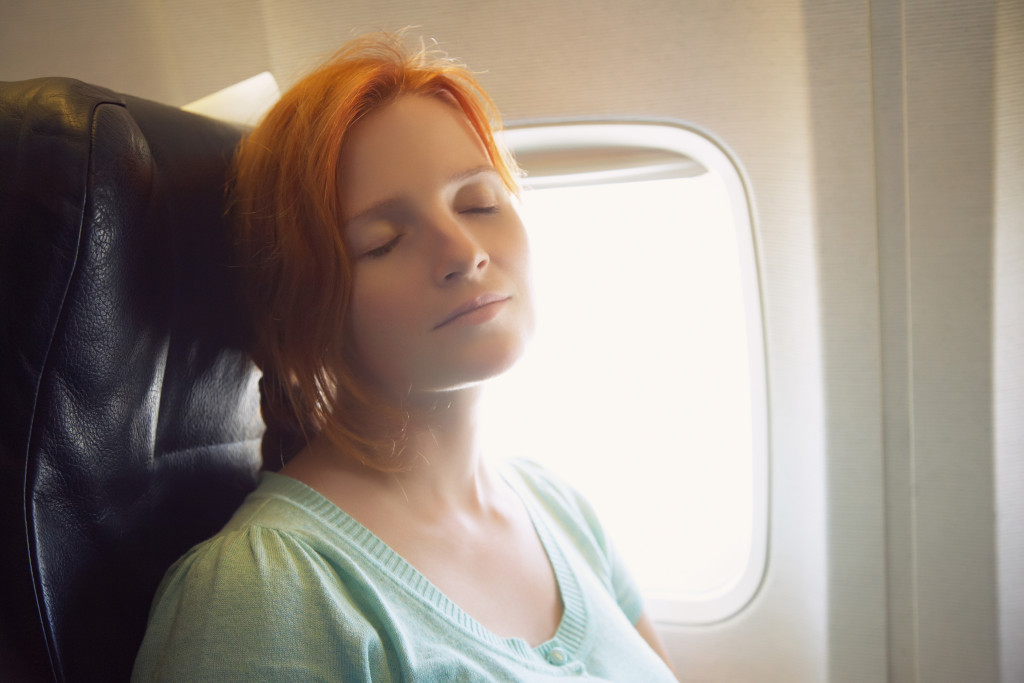Jet lag can be tough on your body. When you travel across multiple time zones, your body’s natural sleep rhythm is interrupted. This can lead to fatigue, insomnia, and a general feeling of malaise. In addition, jet lag can cause digestive problems as your body struggles to adjust to the new time zone. And if you’re trying to stay on a strict schedule while traveling, jet lag can make it difficult to stay focused and productive.
So what can you do to minimize the effects of jet lag? Here are a few tips.
Drink lots of water
When you fly, the dry air in the cabin can dehydrate you, making jet lag worse. Staying hydrated will help combat that dehydration and make it easier for your body to adjust to the new time zone. So drink up!
Aim for eight ounces of water for every hour you’re in the air. And when you land, don’t wait until you’re thirsty to start drinking water again. Keep a water bottle with you and take sips throughout the day. You’ll feel better and be able to enjoy your trip more if you do.
Avoid caffeine and alcohol
Caffeine and alcohol are two of the most common culprits for jet lag. Caffeine is a stimulant, and alcohol is a depressant, so it’s no surprise they can harm your body’s natural circadian rhythms.
If you’re trying to avoid jet lag, it’s best to avoid caffeine and alcohol for at least 24 hours before your flight. This will give your body time to adjust to the new time zone and minimize the impact of jet lag.
Of course, it’s not always possible to completely avoid caffeine and alcohol, but limiting your intake can help reduce the symptoms of jet lag.
Shift your sleep schedule

The best way to combat jet lag is to reset your internal clock before getting on the plane. This means gradually shifting your sleep schedule to match your destination’s time zone. For example, if you are flying from New York to Paris, you would want to start going to bed and waking up earlier each day for a week or so before your trip. Once you arrive in Paris, adjusting to the new time zone will be much easier.
Another helpful tip is to take a melatonin capsule before bed. Melatonin is a hormone that helps regulate sleep, and taking it can help you fall asleep more easily in a new time zone. In recent years, melatonin capsules have become a popular way to combat insomnia and jet lag.
But how does melatonin work? When it’s dark outside, your body produces more melatonin to signal that it’s time to sleep. Melatonin levels rise in the early evening, peak around midnight, and then gradually decline throughout the night. A melatonin supplement can help mimic this natural sleep cycle, making it easier to fall asleep and stay asleep. And because melatonin is a hormone that is already found naturally in the body, it is generally considered safe for most people to take.
Get as much natural light when you arrive
One of the best ways to combat jet lag is to get as much natural light as possible when you arrive at your destination. Exposure to sunlight helps to signal the body that it’s time to wake up and be alert. So, instead of staying indoors, try to spend some time outside in the sun. And if you’re traveling at night, make sure to open the curtains in your hotel room so you can wake up to the sun.
By taking advantage of natural light, you can help your body adjust more quickly to the new time zone and minimize the effects of jet lag.
Eat light
You may have heard that eating a light meal can help prevent jet lag. So how does eating light help? It’s all about timing. If you eat a big meal before your flight, you may feel sluggish and sleepy during the flight. But if you eat a light meal (or no meal), you’ll be less likely to feel drowsy and more likely to adjust quickly to the new timezone.
Of course, everyone is different, so you’ll need to experiment a bit to see what works best for you. But eating light is generally a good strategy for preventing jet lag.
Get some exercise
A good workout will help to regulate your body’s natural rhythms and adjust to the new time zone. It’s best to exercise in the morning, as this will help wake you up and prepare you for the day ahead. And, if you can, try to get some sunlight. Sunlight helps to reset your internal clock and can make a big difference in how quickly you recover from jet lag.
So, next time you feel jet-lagged, don’t just sit around moping — get up and move!
Practice relaxation techniques
One of the best ways to prevent jet lag is to practice relaxation techniques during your flight.
When seated on the plane, take a few deep breaths and close your eyes. Focus on relaxing your body, beginning with your toes and going up to your head. If you begin to feel sleepy, that’s fine — let yourself doze off for a short nap.
Remember, if you’re traveling across time zones, you can do a few things to help your body adjust and minimize the effects of jet lag.
Drink plenty of water, avoid caffeine and alcohol, shift your sleep schedule gradually before departure, get as much natural light as possible when you arrive at your destination, eat lightly and exercise moderately, and practice relaxation techniques such as yoga or deep breathing.
Following these tips can make the transition from one timezone to another a little easier on your body.

